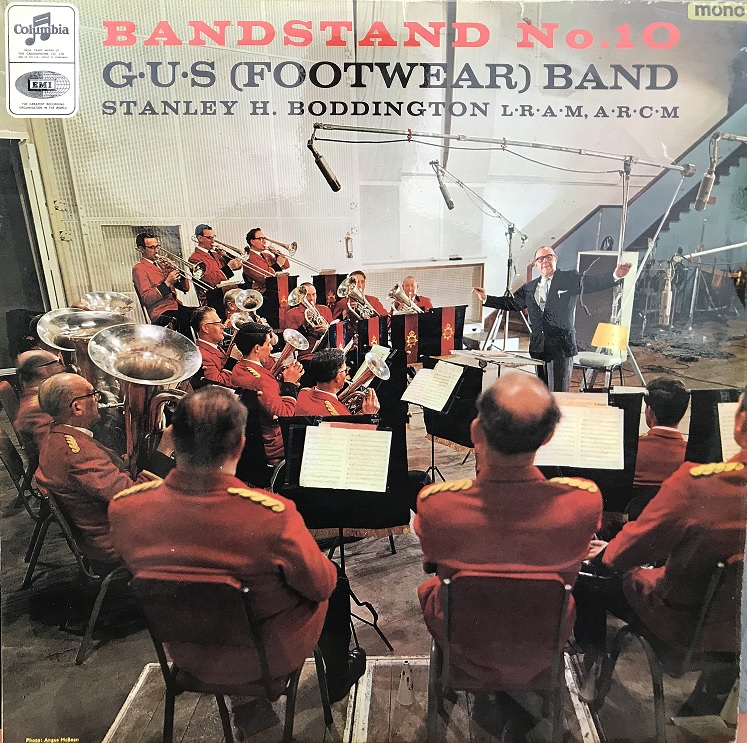
Around the mid-point of the 1960’s GUS (Footwear) were arguably the best band in the world.
National Champion in 1964 and again in 1966 (third in 1965), they were renowned for their compact sound and informed appreciation of style - the foundations put in place by Harry Mortimer but built upon by Stanley Boddington - a player, bandmaster and finally, Musical Director who embodied everything the band stood for from its inception.
As such he never really warmed to what he saw as the ‘Northern’ dynamic requirements of the September British Open at Belle Vue.
In 1964, they came fifth after delivering a stunning performance of ‘Lorenzo’. It later transpired that one of the judges revealed that the men in the box couldn’t hear their refined playing over the noise of the fun fair attractions. As a result, they only returned twice, in 1969 and 1974, before Boddington retired.
Both appearances were on works written by Gilbert Vinter (who had a close musical association with them), and whose ‘Symphony of Marches’ (written in 1963 and given its first commercial recording on this LP) is being revived in 2019 to be used as the First Section Area test piece.
Underrated
This 1966 EMI recording is therefore a timely reminder of a much underrated work, and in retrospect, a much underrated band.
The 10th and last in a ‘Bandstand’ series that stretched back to 1957, it also reinforces Stanley Boddington’s assessment of GUS (Footwear) at the time; a recording display of stylistic refinement, compact tonality and considered dynamics.
Despite some obviously questionable balances and scruffiness, due you suspect to the limitations of the 1960s recording process, there is no hint of raucous overblowing or any needless artifice.
In fact there is a great deal to enjoy.
The 10th and last in a ‘Bandstand’ series that stretched back to 1957, it also reinforces Stanley Boddington’s assessment of GUS (Footwear) at the time; a recording display of stylistic refinement, compact tonality and considered dynamics.
Grooved precision
The renditions of ‘Symphony of Marches’ and ‘The Shipbuilders’ (which is very good) are lightweight in tonality (high pitched instruments remember) by modern day comparison.
And whilst the percussion is rudimentary (the cymbal in the Vinter seems to have come from Ali Baba’s percussion emporium), and the ensemble balance occasionally eye-poppingly wayward, the music retains a grooved precision and vibrancy (‘Symphony of Marches’ opens ‘brilliant and hard’ on the 120 button and closes at a sparkling brioso ppp) that still sounds remarkably fresh.
The hymn tunes are played as they would have been sung – shaped with a caring hand by the MD, although the marches (the ‘Swiss Alpine Club’, a crafty inclusion to perhaps boost overseas sales following a recent visit) now seem like aspic-pickled novelties.
The arrangements are not great (the Rossini a bit of a blunt hatchet job from Frank Wright), but the Cornishman’s beautifully delicate sound, gossamer touch articulation and sublime sense of line and phrasing is a joy to hear.
Joy to hear
Vinter’s witty ‘Lisbon Carnival’ waltz and the boldness of Friedemann’s ‘Slavonic Rhapsody’ (a staple part of any top bands concert repertoire of the time) have aged much better, but it is the playing of John Berryman on ‘Una Voce Poco Fa’ and ‘The Lost Chord’ which retains a timeless delight.
The arrangements are not great (the Rossini a bit of a blunt hatchet job from Frank Wright), but the Cornishman’s beautifully delicate sound, gossamer touch articulation and sublime sense of line and phrasing is a joy to hear.
Half a century later it is playing any modern day principal cornet should take time to consider and learn from, even if few could ever hope to better it.
Iwan Fox
Side 1:
1. March of the Swiss Alpine Club (Anklin)
2. Una Voce Poca Fa (Rossini arr. Wright)
Soloist: John Berryman
3. Symphony of Marches (Vinter)
4. Lisbon Carnival (Vinter)
5. Eternal Father, Strong to Save (Dykes arr. Boddington)
Side 2:
1. Anchors Aweigh (Zimmerman arr. Newton)
2. The Lost Chord (Sullivan arr. Ord Hume)
Soloist: John Berryman
3. The Shipbuilders (Yorke)
4. Slavonic Rhapsody No.1 (Friedemann)
5. King of Glory, King of Peace (Jones arr. Boddington)









